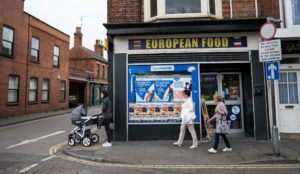There are moments in politics when the elite pull back the curtain and let you know what they really think. The astonishing reaction this week to Lee Anderson is one such moment. After being appointed by Rishi Sunak as the new deputy chairman of the Conservative Party, Anderson, a working-class former coal miner and Labour supporter, found himself under constant attack.
Much like Leave voters after the Brexit revolt, he’s been derided as “thick as mince”, a “northern neanderthal”, an “utterly awful type”, “stupid”, “moronic”, and an apologist for far-Right politics. Ironically, much of this class snobbery has come from the very people who claim to be the most open of all, who would never allow such prejudice were it directed toward any other group in society.
The reaction should not surprise us. As I argue in my new book, the blunt reality is that if, like Lee Anderson, you come from the working class, did not go to university, spent much of your adult life working outside politics, and do not share the liberal if not radically progressive consensus which now pervades our politics and culture, then your voice has been excluded and stigmatised.
The reason Lee Anderson is turning heads is because he stands in such sharp contrast to political institutions which are now overwhelmingly dominated by an elite group, the members of which routinely come from the same social backgrounds, went to the same universities, subscribe to the same cultural values, and increasingly look down the working-class and non-graduate majority with suspicion, if not open contempt.
Just look at our major parties. In recent years, both have been hijacked by this new graduate elite and reshaped around its interests, priorities, tastes, and outlook. As this class has taken control, the share of MPs on the Left and Right who, like Anderson, had a working-class job before entering politics has crashed to just 1%, leaving much of the country without proper representation. Likewise, while roughly 25% of British adults belong to this group (1% of whom are fortunate enough to have gone to Oxbridge), the share of MPs who went to university now stands at 90%, while almost 25% went to Oxbridge.
The transformation of Britain’s political class has been especially visible in the Labour Party, the one institution which through strong trade unions, cooperative societies, working men’s clubs, and mass memberships used to ensure that people from very different backgrounds were given a voice. But today this is no longer true. Back when Neil Kinnock led Labour into battle against Margaret Thatcher in the Eighties, 64 Labour MPs, like Anderson, had previously held working-class jobs. But since then, the number has collapsed. When Tony Blair won his second landslide, in 2001, there were 49. When Ed Miliband was defeated by David Cameron, in 2015, there were 20. When Jeremy Corbyn took over, promising to “restore the voice of the working class”, there were 12. And when Keir Starmer replaced him, after trying to block Brexit, there were just seven. Today, the blue-collar Labour MP is almost extinct. At the last election, in 2019, Labour candidates were the most likely to have postgraduate degrees and were just as likely as Conservatives to have attended Oxbridge.
Across the board, very few of the MPs who are in Westminster, like Anderson, have any meaningful life experience outside our increasingly insular politics. By the time of Brexit, exactly half of all Labour MPs and almost one-third of Conservative MPs were political careerists, having spent much of their adult lives working in and around politics. Today, this grouping is the largest tribe in Westminster, reflecting a politics that has simply become far more homogeneous, technocratic, insular, and removed from the rest of the country. Like many other Western democracies, in other words, Britain has increasingly morphed into what academics Mark Bovens and Anchrit Wille call a “diploma democracy” — a political system that is now completely dominated by graduates, which has been rewired to reflect only their values and interests and actively seeks to actively exclude other voices from discussion.
Aside from leaving millions of people with a palpable sense they are no longer in the political conversation, this is also having other corrosive effects, contributing to what scholars call an “exclusion bias” in the system, constantly skewing the policy agenda to benefit the liberal graduate minority. The widespread dismissal of Lee Anderson’s views regarding the need to stop the small boats in the Channel, push back against radical progressivism or reintroduce capital punishment for some crimes reflects a political system that has been wholly repurposed to serve Westminster’s interests. When it comes to immigration, the prioritisation of globalisation over the national economy, the sheer pace of social and demographic change, the imposition of gender identity theory in schools, and the repudiation of a distinctive British history and culture, the deck is routinely stacked in favour of this minority. Neither Left nor Right have offered a genuine alternative.
But this isn’t just about politics. The hostility that has met the likes of Anderson across much of the country’s media reflects how this new elite has also taken control of almost all of Britain’s most important and influential institutions — the think-tanks, creative industries, cultural institutions, universities, and the media — leaving millions of others with a palpable sense they are no longer part of the national conversation.
And as the graduate class continues to drift further to the Left on cultural issues, they are taking the graduate-heavy institutions with them, pushing them further and further away from the values of the average voter. As this has happened, Britain, like many other Western democracies, has entered a depressing new era of what Michael Lind calls “technocratic liberalism”, a grim new reality in which those organisations that used to provide other social groups with a meaningful pathway into politics, a meaningful voice and serious bargaining power, have either been hollowed out or removed altogether.
This loss of voice for millions of people in our politics and prevailing culture has already had profound effects. As I show in my book, between the Eighties and the early 2020s, voters from the working-class and non-graduate majority have consistently been the most likely to think “people like me have no say in government”, a disillusionment which partly found its expression through the rise of Nigel Farage, then Brexit, and then Boris Johnson, who despite belonging to this new elite grasped the sheer scale of public exasperation with it.
And as many of these voters now look on, watching the likes of Lee Anderson be ridiculed by an identikit political, media, and cultural class, more than a few will almost certainly look for new ways to rebel against a system which, they feel, routinely prioritises the voice of a new graduate elite over everybody else — and which stopped listening to people like them years ago.
Disclaimer
Some of the posts we share are controversial and we do not necessarily agree with them in the whole extend. Sometimes we agree with the content or part of it but we do not agree with the narration or language. Nevertheless we find them somehow interesting, valuable and/or informative or we share them, because we strongly believe in freedom of speech, free press and journalism. We strongly encourage you to have a critical approach to all the content, do your own research and analysis to build your own opinion.
We would be glad to have your feedback.
Source: UnHerd Read the original article here: https://unherd.com/



